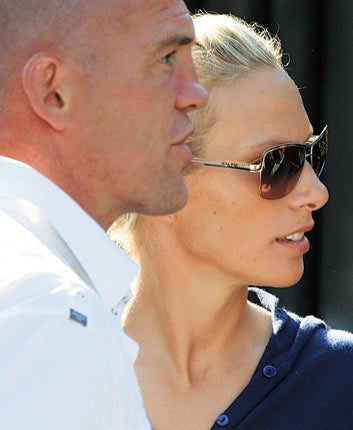James Lawton: Johnson should have sent his vice-captain home as soon as his indiscretions were exposed
Manager had promised firmness if the players proved that his faith in their maturity was misguided

As Zara Phillips landed in Dunedin yesterday trailing embarrassment and, we have to suspect, a considerable degree of humiliation, it was hard not to believe that England's manager Martin Johnson had compounded one folly with another.
First he had made that rather staggering announcement back in England.
He said he would not impose curfews on his players, there being presumably no lessons to be learnt from a recent past in which the indiscipline of England tourists of New Zealand had provoked a full scale inquiry by The Rugby Union, and that the presence of Wags would not only be allowed but welcomed.
Yesterday we saw the full toe-curling consequences as a two-week old soap opera, one running while 19 other nations were able to concentrate rather more keenly on the seventh World Cup of rugby union, revved into top gear. Of course it did as the 13th in line to the succession of the English throne, and a distinguished sportswoman in her own right, was "whisked" to England's team hotel to meet her very recently acquired husband.
There had been much speculation about the nature of this collision, far more certainly than that attached to questions about whether England will shed their depressing habit of conceding stupid penalties before they meet some of the more serious opposition.
Would Tindall be forgiven for his hugely broadcast canoodling with a blonde in the notorious dwarf-tossing bar in Queenstown where England went to "relax" after their leaden performance in the opening game against Argentina?
Would there be tears, perhaps even flying crockery? For it is known that Zara, like her mother, the Princess Royal, has her more forceful moments.
There is, however, a much more relevant question outside the gossip pages and the celebrity websites and it is one most properly addressed to Johnson.
It asks what on earth was he doing allowing this latest soap episode to be taking place in the team hotel where England are supposed to be turning their minds to the challenge of facing Romania tomorrow morning?
Why, to get right down to it, had Tindall not been sent home the moment his indiscretions were exposed? Johnson had promised such firmness when he first announced his decision to put his "adults/blokes" on trust. If they proved his faith in their maturity misguided, then he would have new decisions to make.
Instead of that, he sat and growled at questions that had been pronounced unacceptable before yesterday's press conference. Tindall was there to talk about rugby, we were told, but judging by the far-away look in his eyes there couldn't be much doubt that the machinations of the Romanian back row were pretty low on his agenda.
Why wouldn't they be? Tindall is not some raw-boned contender released into a shockingly big, unfamiliar world. He is a veteran of one of the proudest occasions in English sport, the fabled night in Sydney when Jonny Wilkinson's drop goal won a prize to place along the World Cup won by the team of Bobby Moore at Wembley in 1966. A few weeks ago he had a measure of his new celebrity when he married into the Royal Family.
Yet there he was yesterday contemplating at least some degree of marital crisis at a time when, as vice-captain of a team striving to shake itself into something like convincing form, he might for a few days of his life have been concentrating on the task that was at hand when he arrived in New Zealand. There are some who say that Tindall's lapse, and the pictures of team-mates sprawling around the Altitude bar, represented nothing more than an understandable step down from the harsh pressure that comes with competing at world-class levels. They miss the point entirely. The consequences have run deeper than yesterday's latest distraction from the purpose of the England team's presence in New Zealand.
They have highlighted the same problem encountered by Fabio Capello when he took England's World Cup team to South Africa last summer. The Italian, a graduate from a culture where professional sportsmen are encouraged to believe they are pursuing something of a vocation as much as a highly lucrative way of earning a living, was dismayed by stories of England's Wag circus in the German resort of Baden Baden in 2006. But his decision to go to a remote corner of the veldt for team headquarters was quickly proclaimed a disaster.
Wayne Rooney complained of excruciating boredom. It was a routine of eating and training and playing, and far too much of a strain on professionals earning more than £100,000 a week. Rugby Union, of course, comes from a somewhat different direction, and the defence of Tindall and his fellow revellers is that it is a game whose leading players must never be detached from the company of the fans.
What this has to do with attaining world-class levels of performance was, unfortunately, not overwhelmingly obvious yesterday when Zara met Mike and England's World Cup, once again, stood still.
Subscribe to Independent Premium to bookmark this article
Want to bookmark your favourite articles and stories to read or reference later? Start your Independent Premium subscription today.

Join our commenting forum
Join thought-provoking conversations, follow other Independent readers and see their replies